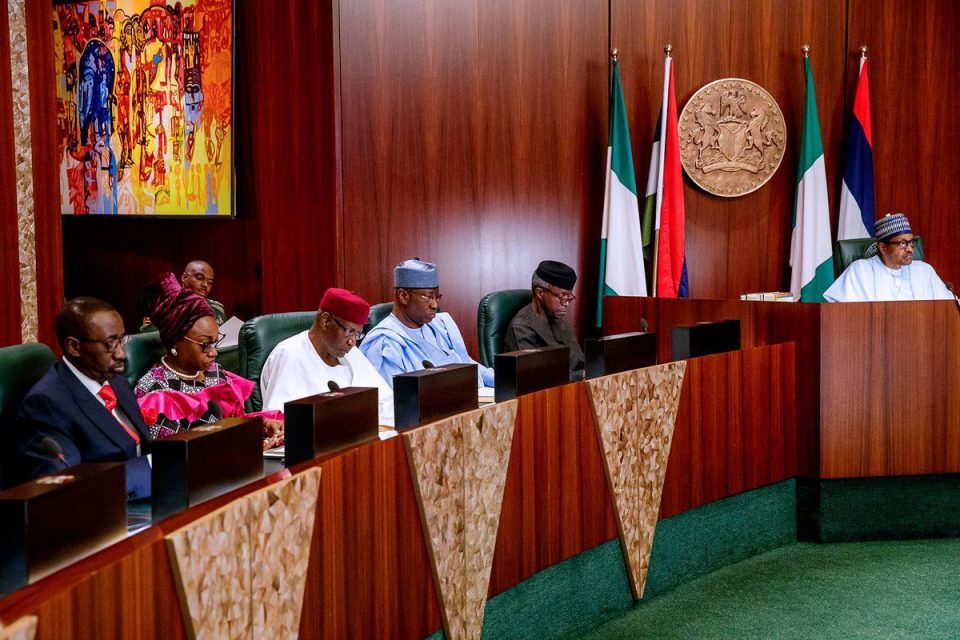Financial experts on Friday expressed mixed reactions to the N10.07 trillion 2020 budget proposal approved by the Federal Executive Council (FEC) ahead of its presentation to the National Assembly.
The experts expressed their views in separate interviews in Lagos.
The Minister of Finance, Budget and National Planning, Hajiya Zainab Ahmed, had on Wednesday briefed State House correspondents on the outcome of the FEC meeting presided over President Muhammadu Buhari.
She revealed that the Council approved the Medium Term Expenditure Framework (MTEF) 2020 to 2022, which would guide the 2020 Budget.
The Minister said the next step was to present the document to the National Assembly for consideration.
“The expenditure for the year 2020 is in the total sum of N10.07 trillion.
“This is three per cent less than the approved expenditure in the 2019 budget that has been passed into law.
“The total expenditure includes statutory transfers, non-debt recurrent expenditure such as salaries and pensions and also the social intervention Programme,’’ she said.
Commenting on the projections, Prof. Tella Sheriffdeen, Professor of Economics, Olabisi Onabanjo University Ago-Iwoye, Ogun said that 2020 budget proposal was conservative and realistic.
He said this was so, given the baseline crude oil output of approximately 2.18 million barrels per day (mbpd) at price of 55 dollars per barrel.
Tella said that the growth rate was also moderate, given the uncertainty in world economiç situation now.
“However, there should be concern for rising debt service by over one trillion naira.
“This will affect allocation for capital expenditure and consequently economic growth.
“Debt servicing is a withdrawal from the economy, except for the proportion that is meant for local creditors.
“So, caution must be observed in securing additional foreign loans from private sources in particular,” he said.
Tella stressed the need to grow the economy without borrowing, noting that this could be done by reducing some intervention subsidy.
“For instance, the electricity companies should be advised to go to the capital market to raise funds by selling shares or private placement.
“They are private businesses and should be so treated,” he added.
Malam Garba Kurfi, the Managing Director, APT Securities and Funds Ltd., the proposed current expenditure of N4.7 trillion compared with N4.3 trillion was on the high side.
Kurfi said that reduction in capital expenditure from 32 per cent to 21 per cent was a matter of concern in view of huge deficit of the infrastructure.
“There is a need to allow private business participate in capital projects through Private Public Participation (PPP),” he said.
Kurfi, however , said that submission of Medium Term Fiscal Framework in September confirmed the readiness to divert from late submission of budget and passage.
Mr Ambrose Omordion, the Chief Operating Officer, InvestData Ltd., said the 2020 budget draft was not realistic as global economy outlook remained mixed and unpredictable.
Omordion said that conflicting policies and unhealthy business environment would further slowdown growth until economic recovery growth plans, disbursement and implementation style were changed and reviewed.
He said lower oil price benchmark of 55 dollar per barrel, oil production of 2.18mbpd, exchange rate of N305 and GDP projection of 2.93 per cent called for concerns due to dwindling revenue and high cost of debt servicing.
Mr Moses Igbrude, Publicity Secretary, Independent Shareholders Association of Nigeria (ISAN), said that budget implementation had remained a problem in Nigeria.
“The proposed budget is not the issue but budget implementation is the major challenge when it comes to the Nigeria’s budget.
“If the little we have as a country is properly and efficiently utilised the citizens will feel the impact but over years it has proved otherwise,” Igbrude said.
“Our recurrent expenditure is increasing, while capital expenditure (productive aspects) is decreasing. How can we borrow for consumption and expect productive economy,” he asked.
Igbrude said that companies should be prepared and get ready for any sudden change that would occur.
He said that more taxes and levies were coming into play in desperation for enhanced revenue generation by the government.




